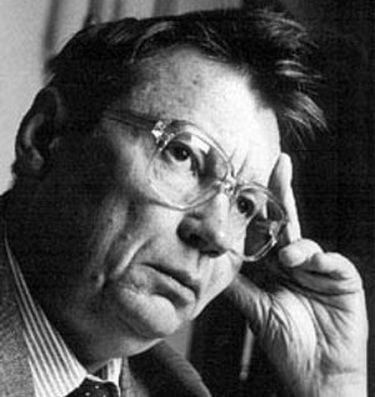
Boris Alexandrovich Tchaikovsky
d. 7 February 1996, Moskau
Boris Alexandrovich Tchaikovsky__ was born in Moscow on 10 September 1925. His mother, a doctor, encouraged his musical talent at an early age. But his father, who is said to have taught himself to play the violin, was also very interested in art and literature alongside his profession as a statistician and economic geographer. He introduced his son to material, philosophical and ethical views that would influence his later work in many ways. The clever structuring of Boris Tchaikovsky's works and his keen sense of proportion can also be traced back to his early experiences and his upbringing at home.
His first composition teachers at Gnessin's music school in Moscow were Eugen Messner and Vissarion Shebalin. In 1943, Tchaikovsky went to the Moscow Conservatory, where he was initially influenced by Nikolai Myaskovsky and later by Dmitri Shostakovich, who began teaching there in 1946. Myaskovsky, with whom Tchaikovsky also graduated in 1949, said of him: ‘... Boris Tchaikovsky is a very talented young composer with a good compositional technique and undoubtedly a significant creative individuality’. Dmitri Shostakovich was so impressed by Tchaikovsky's Symphony No. 1 from 1947 that he immediately recommended it to Yevgeny Mravinsky for performance.
It was recognised early on that Tchaikovsky's clear, densely constructed and always contrasting musical language also had great potential for theatre, film and radio play music. This also stood him in good stead when he took up a position as an editor in the music department of All-Union Radio in 1949, a post he held until 1952. Comparable to Anton Bruckner, for example, the material, the primal cell of his works, from which so much develops in the further course, is often astonishingly simple.
Nevertheless, Tchaikovsky was not able to assert himself sufficiently in the 1950s. On the advice of Dmitri Shostakovich, on whose side he had sided following attacks by the Central Committee of the CPSU, he became First Secretary of the Composers' Union of the Russian Federation in 1968. However, he did so expressly and at his own request in an honorary capacity without any remuneration.
In his home country, no less than Rudolf Barschai, Mstislav Rostropovich and Kirill Kondrashin increasingly campaigned for performances of his works. Tchaikovsky received the USSR State Prize in 1969 for his Symphony No. 2. Four years later, he temporarily gave up his honorary position at the Composers' Association, but returned in the 1980s as a member of the board. In 1989, he became a professor of composition at the Russian Academy of Music, where his students included Rade Radovich, Elena Astafieva, Alexander Khristianov, Stanislav Prokudin and Jakov Kurochkin.
Boris Tchaikovsky died on 7 February 1996 in Moscow.
(This biography can be reprinted free of charge in programme booklets with the following credits: Reprinted with the kind permission of the music publishers Boosey & Hawkes / Sikorski.)
